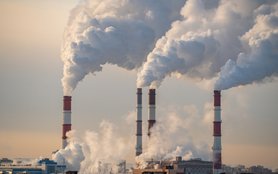Just some of what we’d face: Higher bills, Unbreathable Air, Unsafe homes, Loss of good job opportunities.
The Republican assault on climate programs is giving Big Oil and Gas a blank check to fuel the climate crisis, a lethal driver of hunger and humanitarian crises. They are threatening to expand oil and gas production that will harm the climate and front-line communities. These measures are all intended to benefit mega-corporations, and their billionaire owners - allowing the wealthiest to prosper at the expense of ordinary people and our planet. Oxfam is opposing these measures as well as other proposals to gut essential programs like health care and food assistance.
The Trump Administration and some Congressional Republicans are threatening to cut Inflation Reduction Act (IRA) provisions that are designed to support working class and marginalized communities. The IRA allocated approximately $60 billion specifically for initiatives directed toward enabling disadvantaged communities to reduce their energy costs, start new businesses and get good, well-paying jobs.
The new head of the Environmental Protection Agency is trying to claw back $20 billion in funding already committed to the Greenhouse Gas Reduction Fund which is supposed to fund tens of thousands of projects across the country combating climate change in disadvantaged communities. The EPA has also terminated $7 billion in contracts awarded through the Solar for All program to deliver clean energy and lower energy prices to disadvantaged communities. Some Republicans have called for cutting all funding for the IRA. House Republicans have now introduced legislation to cut all unspent funds for the Greenhouse Gas Reduction Fund, as well as other funds for programs such as loan guarantees for tribes, efficiency grants, grants to improve electricity transmission and others. Their legislation would also effectively phase out tax credits to businesses that support the build-out of clean energy. If they get their way, these cuts will:
- Deprive low-wage households of help to reduce their energy costs and reliance on fossil fuels;
- Reduce job training and employment opportunities in the renewable energy sector;
- End programs to help historically marginalized groups to access renewable energy opportunities and thus ensure environmental justice;
- Reduce programs that help people at greater risk from climate disasters to strengthen their infrastructure to protect themselves;
- Defund and delay a penalty that oil and gas companies are to pay when they wastefully leak methane gas from oil and gas facilities into the atmosphere; and
- End grants and incentives designed to decrease harmful pollutants from transportation, manufacturing, and power generation, particularly in places where exposure has led to damaging health issues.
If fully implemented, the IRA is expected to help reduce US greenhouse gas emissions by 33–43% by 2030 compared to 2005 levels. Frontline communities pay the highest price for oil and gas production and increased emissions, they are robbed of their lives and livelihoods as extreme weather events and temperatures increase, sea level rise and crops fail in the US and around the world. The cuts will disproportionately affect women in underserved communities by failing to fund programs that address environmental injustices for which they face the greatest burden.
Cuts in IRA implementation also will eliminate tens of thousands of programs and hundreds of thousands of jobs in every state in America. Here are several programs at risk:
North Carolina’s Home Energy Rebates program, the Home Efficiency Rebates and the Home Electrification and Appliance Rebates program aim to drastically reduce the cost of energy-saving home upgrades. The rebate programs focus on single-family, owner-occupied housing, giving priority to homes in disadvantaged regions and in areas affected by hurricane damage.
With funding from the IRA, Louisiana Clean Fuels, Inc., a not-for-profit launched a program to incentivize and accelerate the upgrade or retirement of older diesel engines to cleaner and zero-emission solutions. Exposure to diesel exhaust can lead to serious health conditions like asthma and respiratory illnesses and worsen existing heart and lung disease, especially in children and the elderly. Diesel exhaust contributes to global climate change, damages our environment by producing ground-level ozone which impacts crops, trees and other vegetation, and produces acid rain. This program will be shuttered if Congressional funding is cut off.
The IRA Solar for All Program aims to ensure that for the first time in history, low-income and disadvantaged communities in every state and territory and Tribes across the country have access to affordable, resilient, and clean solar energy. In the US South, where the energy burden is high and solar has been out of reach for many families, Solar for All is a transformational opportunity to lower energy bills, build resilience, and create jobs and entrepreneurship opportunities. In Houston’s iconic and predominantly Black 5th Ward neighborhood, solar panels and a battery have been installed in private residences as part of a pilot for expanding solar into low-income communities. The benefits have been immediate: electricity bills were cut in half and their lights and air conditioning stayed on when the grid failed.
Michelle Moore, CEO of Groundswell, a nonprofit from LaGrange Georgia said “When you look at many of the programs that were stood up under the IRA, it’s a huge investment in rural America. I would imagine the biggest in 100 years — since rural electrification,” referring to the federal government’s role in bringing electricity to rural communities in the 1930s. “The federal government has contractual responsibilities to our coalition, but more importantly, to the rural and small town communities we’re serving.”
All of these programs are now in jeopardy. Congress must fully and faithfully implement all of the programs with funding from the IRA. It is essential for all Americans to call on their Congressional representatives to oppose these threats to the IRA and to other programs essential to people’s livelihoods and safety.



